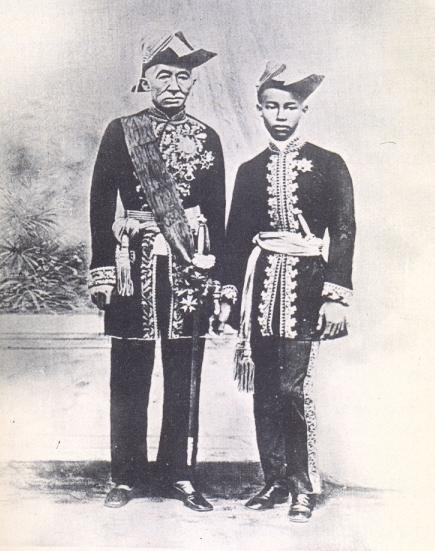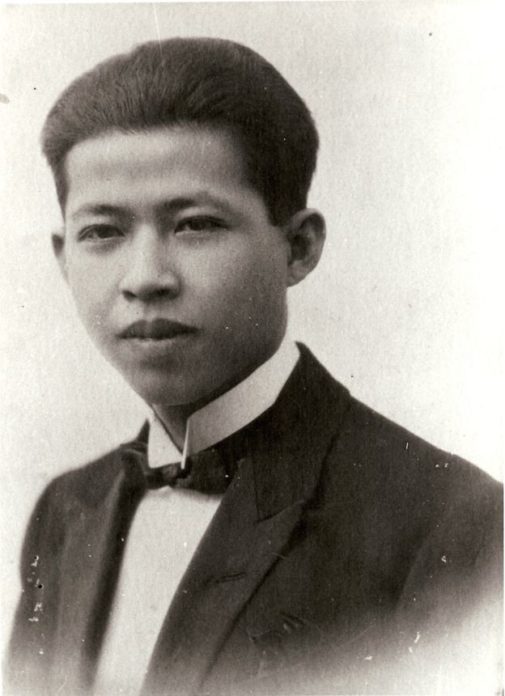|
Phra Phimontham
Phra Phimontham (; 1901–1992) was a Thai monk of the Mahanikay order. Phra Phimontham served as the abbot of Wat Mahathat in Bangkok from 1947 until 1960. He was a proponent of '' vipassana'' meditation, and traveled frequently between Thailand and Burma. Phimontham also gained a reputation as a pro-democratic monk, which garnered resistance from both the Thai government and the Thai ''sangha''. In 1962, Phimontham was forcefully disrobed, imprisoned, and charged with being a communist. Early life and education Phra Aat Asaphathera or Aat Asabho (lay name Aat Duangmala) was born in 1901 in the village of Bahn Don in the northeastern Thai province of Khon Kaen, the oldest of four children born to Phim and Jae Duangmala. Despite his origins in this rural and predominantly Lao-speaking region, far from the Bangkok establishment, he proved to be a capable student and scholar. After ordination in the Mahanikay order in 1914, Phra Aat advanced quickly through the monastic ranks. ... [...More Info...] [...Related Items...] OR: [Wikipedia] [Google] [Baidu] |
Thailand
Thailand, officially the Kingdom of Thailand and historically known as Siam (the official name until 1939), is a country in Southeast Asia on the Mainland Southeast Asia, Indochinese Peninsula. With a population of almost 66 million, it spans . Thailand Template:Borders of Thailand, is bordered to the northwest by Myanmar, to the northeast and east by Laos, to the southeast by Cambodia, to the south by the Gulf of Thailand and Malaysia, and to the southwest by the Andaman Sea; it also shares maritime borders with Vietnam to the southeast and Indonesia and India to the southwest. Bangkok is the state capital and List of municipalities in Thailand#Largest cities by urban population, largest city. Tai peoples, Thai peoples migrated from southwestern China to mainland Southeast Asia from the 6th to 11th centuries. Greater India, Indianised kingdoms such as the Mon kingdoms, Mon, Khmer Empire, and Monarchies of Malaysia, Malay states ruled the region, competing with Thai states s ... [...More Info...] [...Related Items...] OR: [Wikipedia] [Google] [Baidu] |
Boworadet
Prince Boworadej (; ; 2 April 1877 – 16 November 1953) was a Thai attempted-coup leader, government official, General, and royalty. After defeat in the 1933 rebellion, he sought asylum in Cambodia where he lived until 1948 when he returned to Thailand and died in 1953. Early life Mom Chao Boworadej Kridakorn born on 2 April 1877 in Bangkok. Boworadej was one of the grandsons of King Mongkut, a son of Prince Naret. Boworadej received his military education at the Harrow School in 1898, and the Royal Military Academy Woolwich in 1900. Boworadej moved back to Siam in 1900 to serve in Royal Thai Army's Command and General Staff Department. Government official career Boworadej was a career soldier who had served as an ambassador in Paris towards the end of King Chulalongkorn's reign from 1902 to 1905. He was "retired" in the latter part of King Vajiravudh's reign, but he was brought back into active service shortly after King Prajadhipok ascended the throne. Boworadej became the ... [...More Info...] [...Related Items...] OR: [Wikipedia] [Google] [Baidu] |
King Chulalongkorn
Chulalongkorn (20 September 1853 – 23 October 1910), posthumously honoured as King Chulalongkorn the Great, was the fifth king of Siam from the Chakri dynasty, titled Rama V. Chulalongkorn's reign from 1868 until his death in 1910 was characterised by the modernisation of Siam, governmental and social reforms, and territorial concessions to the British and French empires. As Siam was surrounded by European colonies, Chulalongkorn, through his policies and acts, ensured the independence of Siam. Chulalongkorn was born as the son of Mongkut, the fourth king of Siam. In 1868, he travelled with his father and Westerners invited by Mongkut to observe the solar eclipse of 18 August 1868 in Prachuap Khiri Khan Province. However, Chulalongkorn and his father both contracted malaria which resulted in his father's death. The 1893 Franco-Siamese crisis and Haw wars took place during his reign. All his reforms were dedicated to ensuring Siam's independence given the increasing ... [...More Info...] [...Related Items...] OR: [Wikipedia] [Google] [Baidu] |
Satipatthana Sutta
The ''Satipaṭṭhāna Sutta'' ( Majjhima Nikaya 10: ''The Discourse on the Establishing of Mindfulness''), and the subsequently created Mahāsatipaṭṭhāna Sutta (Dīgha Nikāya 22: ''The Great Discourse on the Establishing of Mindfulness''), are two of the most celebrated and widely studied discourses in the Pāli Canon of Theravada Buddhism, acting as the foundation for contemporary '' vipassana'' meditation practice. The Pāli texts of the Satipaṭṭhāna Sutta and the Mahāsatipaṭṭhāna Sutta are largely similar in content; the main difference being a section about the Four Noble Truths (Catu Ariya Sacca) in the Observation of Phenomena (Dhammānupassana), which is greatly expanded in the Mahāsatipaṭṭhāna Sutta. These suttas (discourses) stress the practice of sati (mindfulness) "for the purification of beings, for the overcoming of sorrow and lamentation, for the extinguishing of suffering and grief, for walking on the path of truth, for the realization of ' ... [...More Info...] [...Related Items...] OR: [Wikipedia] [Google] [Baidu] |
Sri Lanka
Sri Lanka, officially the Democratic Socialist Republic of Sri Lanka, also known historically as Ceylon, is an island country in South Asia. It lies in the Indian Ocean, southwest of the Bay of Bengal, separated from the Indian subcontinent, Indian peninsula by the Gulf of Mannar and the Palk Strait. It shares a maritime border with the Maldives in the southwest and India in the northwest. Sri Jayawardenepura Kotte is the legislative capital of Sri Lanka, while the largest city, Colombo, is the administrative and judicial capital which is the nation's political, financial and cultural centre. Kandy is the second-largest urban area and also the capital of the last native kingdom of Sri Lanka. The most spoken language Sinhala language, Sinhala, is spoken by the majority of the population (approximately 17 million). Tamil language, Tamil is also spoken by approximately five million people, making it the second most-spoken language in Sri Lanka. Sri Lanka has a population of appr ... [...More Info...] [...Related Items...] OR: [Wikipedia] [Google] [Baidu] |
Chulalongkorn University
Chulalongkorn University (CU; ; , ) is a public university, public Autonomous university, autonomous research university in Bangkok, Thailand. The university was originally founded during King Chulalongkorn's reign as a school for training royal pages and civil servants in 1899 (B.E. 2442) at the Grand Palace. It was later established as a national university in 1917, making it the oldest institute of higher education in Thailand. During the reign of Chulalongkorn's son, King Vajiravudh, the Royal Pages School became the Civil Service College of King Chulalongkorn. The Rockefeller Foundation was instrumental in helping the college form its academic foundation. On 26 March 1917, King Vajiravudh renamed the college "Chulalongkorn University". Chulalongkorn University is one of the National Research Universities and supported by the Office of Nation Education Standards and Quality Assessment of Thailand. Moreover, CU is the only Thai university which is a member of Association o ... [...More Info...] [...Related Items...] OR: [Wikipedia] [Google] [Baidu] |
Frank Buchman
Franklin Nathaniel Daniel Buchman (June 4, 1878 – August 7, 1961), best known as Frank Buchman, was an American Lutheran who founded the First Century Christian Fellowship in 1921, renamed as the Oxford Group in 1928, that was transformed under his leadership in 1938 into the Moral Re-Armament and became Initiatives of Change in 2001. As a leader of the Moral Re-Armament, he was decorated by the French and German governments for his contributions to Franco-German reconciliation following the end of World War II. Early life and education Buchman was born on June 4, 1878, in Pennsburg, Pennsylvania, the son of Sarah (Greenwalt) and Franklin Buchman, a farmer, then hotelier, restaurateur, and eventually wholesale drinks salesman. His mother was a pious Lutheran. At age sixteen, circa 1894, he moved with his parents to Allentown to enter high school and then attended Muhlenberg College, where he graduated. He then moved to Philadelphia to enter Mount Airy Lutheran Seminary an ... [...More Info...] [...Related Items...] OR: [Wikipedia] [Google] [Baidu] |
Moral Re-Armament
Moral Re-Armament (MRA) was an international moral and spiritual movement that, in 1938, developed from American minister Frank Buchman's Oxford Group. Buchman headed MRA for 23 years until his death in 1961. In 2001, the movement was renamed Initiatives of Change. History Beginning In 1922, Frank Buchman left his teaching position at the Hartford Seminary Foundation to pursue a ministry focused on individual spiritual transformation and global evangelism. His tenets focused on the ' Four Absolutes' which were absolute honesty, absolute purity, absolute unselfishness, and absolute love. This approach emphasized divine guidance, adherence to moral principles, and personal interaction as catalysts for change. Buchman relocated his activities to Princeton University, where student discussions he organized included public confessions of sexual activities. The discussions generated controversy, resulting in university president John Hibben banning Buchman from campus. He subsequent ... [...More Info...] [...Related Items...] OR: [Wikipedia] [Google] [Baidu] |
Sixth Buddhist Council
The Sixth Buddhist Council (; ; ) was a general council of Theravāda Buddhism, held in a specially built Mahā Pāsāṇa Guhā (Great Cave) and pagoda complex at Kaba Aye Pagoda in Yangon, Burma. The council was attended by 2500 monastics from eight Theravādin Buddhist countries. The Council lasted from Vesak (Visākha) 1954 to Vesak 1956, its completion coinciding with the traditional 2500th anniversary of the Gautama Buddha's . In the tradition of past Buddhist councils, a major purpose of the Sixth Council was to preserve the Buddha's teachings and practices as understood in the Theravadin tradition. Over the two-year period, monks (') from different countries recited from their existing redaction of the Pāli Canon and the associated post-canonical literature. As a result, the Council synthesized a new redaction of the Pali texts ultimately transcribed into several native scripts. Timing and participants The Council was convened 83 years after the Burmese Fifth B ... [...More Info...] [...Related Items...] OR: [Wikipedia] [Google] [Baidu] |
Mahasi Sayadaw
Mahāsī Sayādaw U Sobhana (, ; 29 July 1904 – 14 August 1982) was a Burmese Theravada Buddhist monk and meditation master who had a significant impact on the teaching of vipassanā (insight) meditation in the West and throughout Asia. In his style of practice, derived from the so-called New Burmese Method of U Nārada, the meditator lives according to Buddhist morality as a prerequisite for meditation practice. Meditation itself entails the practice of "bare insight," using '' satipaṭṭhāna'', the four foundations of mindfulness, to anchor the attention on the sensations of the rising and falling of the abdomen during breathing, observing carefully any other sensations or thoughts. This is coupled to reflection on the Buddhist teachings on causality, thereby gaining insight into '' anicca'', '' dukkha'', and '' anattā'' and attaining stream entry. Mahāsī Sayādaw was a questioner and final editor at the Sixth Buddhist Council on May 17, 1954. Biography Mahās ... [...More Info...] [...Related Items...] OR: [Wikipedia] [Google] [Baidu] |
Pridi Banomyong
Pridi Banomyong (, , ; 11 May 1900 – 2 May 1983), also known by his noble title Luang Praditmanutham (), was a Thai lawyer, professor, activist, politician, and senior statesman. He served in multiple ministerial posts, as regent, and as prime minister in Thailand. He led the civilian wing of Khana Ratsadon, and helped found the University of Moral and Political Sciences and the Bank of Thailand. Born to a family of farmers in Ayutthaya province, he received a good education, becoming one of the nation's youngest barristers in 1919, at the age of nineteen. In 1920, he won a royal scholarship granted by the King of Siam to study in France, where he graduated from the University of Caen with a master's degree, and received a doctorate from the University of Paris in 1927. In the same year, he co-founded Khana Ratsadon with like-minded Siamese overseas royal-sponsored students. After returning to Thailand, still called Siam at the time, he worked as a judge, judicial secretari ... [...More Info...] [...Related Items...] OR: [Wikipedia] [Google] [Baidu] |



